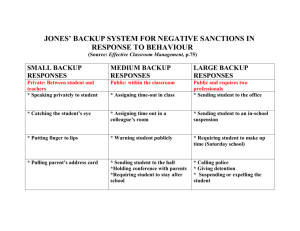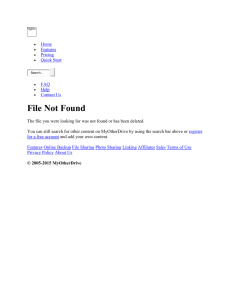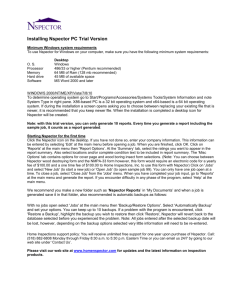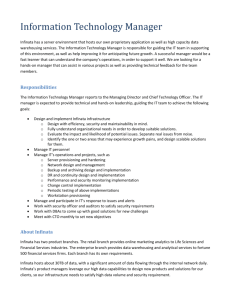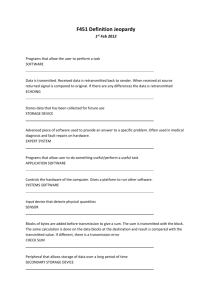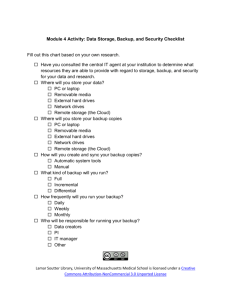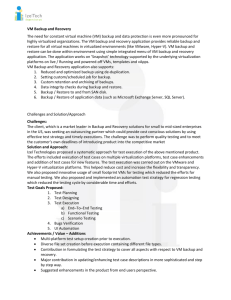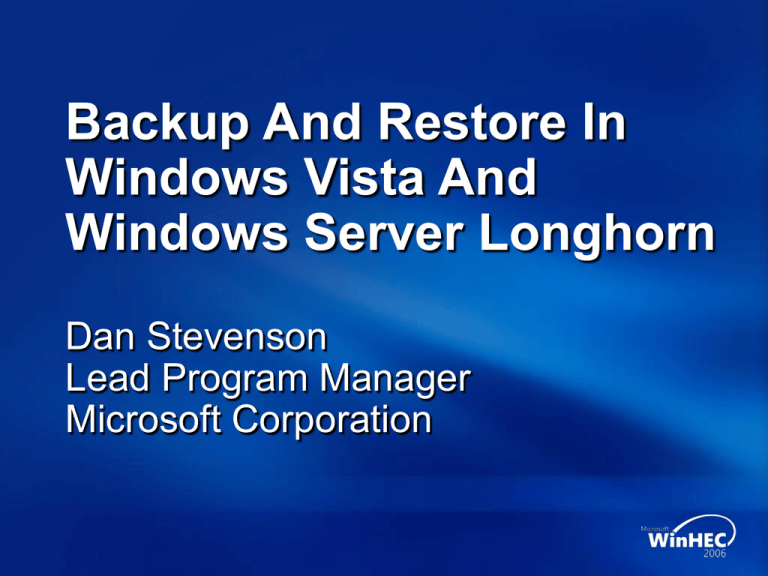
Backup And Restore In
Windows Vista And
Windows Server Longhorn
Dan Stevenson
Lead Program Manager
Microsoft Corporation
Backup Is New And Different
Brand new backup and restore features for
Windows Vista and Windows Server
Longhorn
Focus: Usability, simplicity, and suitability
Bottom line
More people doing more backups
Right features for the right people
New Features
File backup and
restore
Simple and automatic
protection
CompletePC™
backup and restore
Block-level image
Entire computer
Server backup
Files, folders, disks,
common workloads
System Restore
System state repair
Fix non-booting OS
Shadow Copies
Previous file versions
No backup required
Great features, but not as
interesting for WinHEC.
Backup Media
Optical media (CDs, DVDs, beyond),
hard disks, and file servers… but not tape
Third-party backup applications can
and will continue to support tape media
No change in driver support
NT Backup “reader” as Web download
New Backup Infrastructure
All backup features are based on the
Volume Shadow Copy Service (VSS)
Universal backup API for Windows
Point-in-time “snapshots” of a disk
Guaranteed consistency and file access
Backup to optical media using UDFS
Windows Recovery Environment for
“offline” repair or restore
File Backup
Designed to be as easy as possible
Simple and reliable
Three easy questions:
Where? What? When?
CD, DVD, hard disk,
and file server
Restore is even easier
Familiar Windows Explorer interface
Restore one or all users, same or alternate
location, same or different PC
File Backup Details
Files saved in 200 MB zip files
Schedule and catalog are resilient
System, temporary files are not backed up
Present in all SKUs except Starter
Must be administrator to configure backup
Any user can restore his or her own files
Only administrator can restore for all users
CompletePC Image Backup
Block-level backup of the entire PC
Great disaster recovery solution for
consumers and small businesses
Back up to an external hard disk,
internal disk partition, or a set of DVDs
Easy restore via Windows Recovery
Environment (Windows RE)
CompletePC Backup Details
Block-level backup is very fast and efficient
Clever way to do incremental backups:
each backup is “full” but deltas are small
Backup file is VHD format (Virtual PC)
CompletePC Backup is present only in
Business, Enterprise, and Ultimate SKUs
Only an administrator can run backup
CompletePC Restore Details
Can restore all disks, or just system disks
Adapts to disk configuration changes
No more floppy disk requirement
Windows RE is not SKU-differentiated
Only physical access is required to restore
Incremental Image Backups
Application
writes to disk
Source disk
block-level
backup
update backup
image
Backup disk
(image stored
in VHD file)
Shadow copy storage
to track changes
block-level restore
Restored disk
disk,
same as updated
source
source disk
Older restored disk,
based on shadow copy
Windows RE Details
Based on Windows PE
Automatic recovery using Startup Repair
Auto-repairs >80% of boot failure causes
Leverages system instrumentation to
diagnose driver errors and boot status
Manual recovery tools, including
CompletePC restore
Windows RE Auto-Repair
Boot manager
detects failure
Computer
Bluescreens
Fail over into
Windows RE
Auto-launch
Startup
Repair
Reboot
No
Windows Vista
starts
>5
attempts?
Successful boot?
Yes
No
Reboot
Diagnose
and repair
computer
Yes
Cannot
auto-repair
(try manual)
Windows Server Backup
Targeted at small business/DIY admin
Same block-level engine as Windows
Vista’s CompletePC Backup
Efficient incremental backups
DVD, hard disk, or file server, but not tape
Restore entire computer, system state,
individual files, and application databases
Familiar MMC look-and-feel, plus a
full-featured command-line tool
Server Backup Details
Many scheduling options
“No management” media rotation
Restore directly from backup image
Files, folders, and whole disks
SQL Server, Exchange, SharePoint data
Restore computer from Windows RE
Bare metal or system state-only
Must be an administrator to use
Windows CompletePC
Image Backup And Restore
Hardware Opportunities
Focus on new backup media
Windows Vista and Windows Server
“Longhorn” support new backup media
CD, DVD, and larger via UDFS
Hard disks, especially for block-level backup
With these features, more customers will
use hard disks and CDs/DVDs for backup
Hardware Opportunities
In Windows Vista, NTFS pays attention
to the “hot pluggable” device policy
Default is “optimize for removal” (slow)
User or tool can set “optimize for performance”
Devices must have Windows Vista logo
Other considerations
Please don’t under/over-report capabilities
Allow cancellation of writing and formatting
Do not incorrectly report disk as “removable”
Hardware Opportunities
Recommended configurations
File Backup
CompletePC Backup
and Server Backup
USB hard disk
Best with NTFS,
Incremental requires NTFS,
optimized for performance optimized for performance
CD/DVD
All writable media
should work
All writable DVD media
should work
Removable hard
disk (cartridge)
Best results with NTFS,
will span if gets too big
Only spanning (no
incrementals)
USB flash disk
Not directly supported
(will work if “reader”)
Not directly supported
Integration Points
File backup
Runs as a scheduled task, which can be
modified or disabled
CompletePC and Windows Server Backup
Scriptable command-line tool “wbadmin.exe”
exposes all backup and restore functionality
Server backup runs as a scheduled task
Windows RE can be customized
Interesting Future Problems
Interesting Future Problems
New and different backup media
Large-capacity USB flash devices, cartridgestyle hard drives, network “cloud” storage
Challenge of shared access
Backup media longevity is very important
Windows RE is not always available
Customers use large-capacity portable
storage media for more than backup
Call To Action
Develop backup devices and media
Give Microsoft feedback on features,
requirements, and hardware directions
Ensure devices and media work with the
new backup features, and certify via the
Windows Vista Hardware Logo Program
Start planning for Windows Vista launch
Take Windows Vista 101 online course,
learn about partner opportunities
Additional Resources
Partner Marketing Day – 6/14 in
San Francisco: dmoulton@microsoft.com
Windows Vista 101:
www.windowsvista.com/partner
Hardware logo program and resources:
www.microsoft.com/whdc
Feedback and questions:
recovery @ microsoft.com
Backup Is Important
(Obligatory hockey stick chart)
home
data
disk
size
1940 GB
478 GB
15,000,000
home
file servers
322 GB
86 GB
340,000
2004 2005 2006 2007 2008 2009 2010
Home data and file servers from Coughlin, 8/05
Disk size from Gartner, 4/05
© 2006 Microsoft Corporation. All rights reserved. Microsoft, Windows, Windows Vista and other product names are or may be registered trademarks and/or trademarks in the U.S. and/or other countries.
The information herein is for informational purposes only and represents the current view of Microsoft Corporation as of the date of this presentation. Because Microsoft must respond to changing market
conditions, it should not be interpreted to be a commitment on the part of Microsoft, and Microsoft cannot guarantee the accuracy of any information provided after the date of this presentation.
MICROSOFT MAKES NO WARRANTIES, EXPRESS, IMPLIED OR STATUTORY, AS TO THE INFORMATION IN THIS PRESENTATION.

